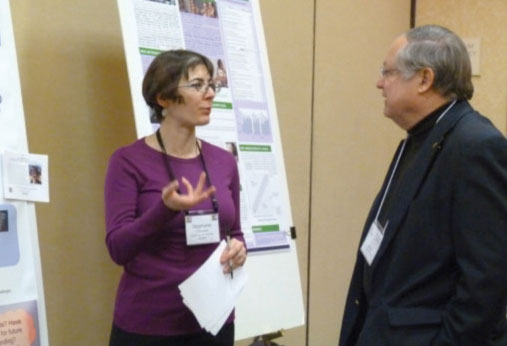PhysTEC 2012 Annual Conference
By Jacob Clark Blickenstaff and Bushraa Khatib, American Physical Society
The 2012 PhysTEC Conference was held in Ontario, California on February 3-4, 2012 with the theme of New Paradigms for Physics Teacher Education. The date and location were chosen to coordinate with the Winter 2012 AAPT meeting that immediately followed. The 124 participants were pleased with the quality of conference sessions, with several commenting that this was the best PhysTEC conference yet. Plenaries by by Fred Goldberg, Phil DiStefano, and Mary Kirchhoff were well received. Dr. Kirchhoff's plenary was one part of the significant presence of the American Chemical Society, which is launching the Chemistry Teacher Education Coalition (CTEC) to address the national shortage of high school chemistry teachers.
This year's PhysTEC conference was preceded by a day-long regional conference involving 80 representatives of two math and science teacher preparation efforts in California that had never before met together. The Math and Science Teacher Initiative (MSTI) of the California State University system and CalTeach at the University of California came together for the first time to discuss physics and chemistry teacher preparation efforts.
Collaboration between the two distinct groups with similar aims generated healthy discussion as leaders from both organizations offered their insights on issues such as student recruitment and retention, course transformation, student-centered teaching, and how to streamline teacher licensure. Stephen and Phoebe Roeder from the physics department at San Diego State University found discussions on increasing enrollment and finding new sources for funding highly relevant to their university.
At the PhysTEC meeting, a panel discussion on cultural perspectives on teacher education moderated by Peter Muhoro of the APS, addressed underrepresentation of minorities in the population of U.S. physics teachers. The session featured faculty from minority-serving institutions and high school physics teachers from schools with significant minority populations. Panelists and participants candidly discussed cultural issues that rarely make it to the forefront of physics education.
Panelist Geraldine Cochran, a doctoral student at Florida International University, expressed her belief that minority students do not necessarily need to have role models that look like themselves in order to be inspired to pursue physics or teaching themselves. "This can be accomplished by good teaching, regardless of the student or teacher's personal background," Cochran said.
Vivian Incera, chair of the University of Texas at El Paso physics department, and Victor Gonzalez, AP physics teacher at Pioneer High School in southern California, cited examples of how sharing cultural backgrounds with their students gave them more insight into their students' experiences. "In the Latino culture, students have a hard time explaining physics as a career choice to their parents. I tell them to tell their parents that they're going into engineering instead," Gonzalez said.
Abstracts from the meeting are available in the APS Bulletin. Presentations are available for download on the PhysTEC conference website.
The 2013 PhysTEC annual conference will be held March 16 and 17 in conjunction with the APS March meeting Baltimore, MD.

Jack Hehn of AIP and Stephanie Chasteen, CU Boulder, in conversation at the PhysTEC poster session.
Jacob Clark Blickenstaff taught high school physics in California for five years before returning to graduate school at UC Davis. He earned a PhD in science education in 2004, and has held faculty positions at Western Washington University and the University of Southern Mississippi. He is Teacher Education Programs Manager for APS.
Bushraa Khatib is a recent graduate of the University of Maryland, Baltimore County with a double major in Biochemistry and English Literature. She joined APS in October 2011 as Programs Coordinator for the APS Bridge Program.
Disclaimer–The articles and opinion pieces found in this issue of the APS Forum on Education Newsletter are not peer refereed and represent solely the views of the authors and not necessarily the views of the APS.
